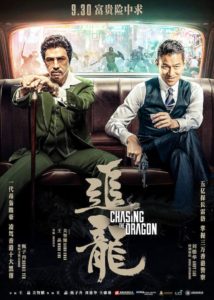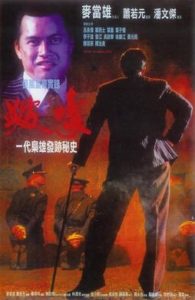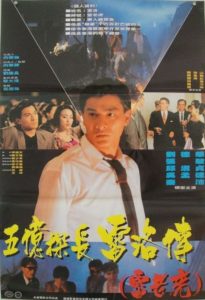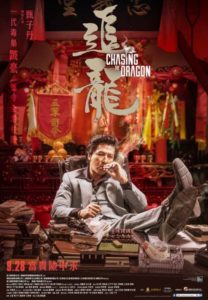Chasing the Dragon
追龙
Hong Kong/China, 2017, colour, 2.35:1, 128 mins.
Directors: Wang Jing 王晶 [Wong Jing], Guan Zhiyao 关智耀 [Jason Kwan].
Associate director: Zhang Min 张敏 [Aman Chang].
Rating: 8/10.
Topnotch slice of retro pulp cinema, with two strong leads and an evocative period flavour.
Hong Kong, 1960. Young Chaozhou [Teochew] Chinese immigrant Wu Shihao (Zhen Zidan) arrives with his younger brother Ping (Li Risheng) and friends Dawei (Jiang Haowen), Xiwei (Liu Haolong) and Qi (Yu Kang) to become rich and famous in the territory. Hearing that gang brawling is better paid than construction work, they join a street fight between the Grizzly Bear and Strong Doll gangs. While Wu Shihao is beating up a corrupt British policeman, Ernest Hunt (Bryan Larkin), he’s stopped by detective inspector Lei Luo (Liu Dehua) and arrested. After Ernest Hunt beats up Wu Shihao in his cell, Lei Luo and an honest Hong Kong policeman (Huang Rihua) look after him, and Lei Luo  gives him and his group HK$500 to get started. As Lei Luo becomes more influential, taking over Jianshazui [Tsim Sha Tsui] district in south Kowloon from his arrogant colleague Yan Tong (Tang Zhenye), Wu Shihao slowly works his way up through the underworld to running a drugs business in Kowloon Walled City and working for gang leader Fat Chao (Wu Yijiang). Lei Luo pays him a visit and says that one day he’ll have need of him. However, after the death of his wife Mei (Zhou Liqi) when being smuggled in by boat, Wu Shihao becomes more introverted and moody. Six months later, Luo Lei and his police sidekick Lard (Zheng Zeshi) have become worried that a gang war is about to break out, due to the ever-growing boldness of Grizzly Bear (Wang Juntang). When Lei Luo is set up for the murder of Walled City ganglord Ding (Chen Huimin) by Strong Doll (Huang Junfeng), Wu Shihao saves his life but has his leg broken on Fat Chao’s orders. Wu Shihao eventually leaves hospital and marries his nurse Qing (Hu Ran). In 1965 Lei Luo proposes splitting the proceeds on all crime business (drugs, prostitution and so on) between the two of them, and both enjoy good times. After a while, however, Lard warns Lei Luo that Wu Shihao is becoming cocky and not respecting the rules. Lei Luo proposes that Wu Shihao keeps Kowloon but that two other gang leaders – Rong (Zhou Junwei) and Rose (Xu Dongdong) – should be brought in on other districts, as well as Fat Chao, who’s just been released from a spell in prison. Wu Shihao unwillingly agrees but slices off Fat Chao’s ear as payback. Though he’s responsible for its import, Wu Shihao becomes angry when he finds his younger brother Ping is on heroin. When the supply of heroin is threatened by the death of a Golden Triangle druglord, Wu Shihao goes to Thailand with his team and Rose to sort things out with the druglord’s successor – a trip that involves several deaths. Back in Hong Kong, as Ping’s drug cravings get worse, things boil over between Wu Shihao and his enemies Fat Chao and Ernest Hunt.
gives him and his group HK$500 to get started. As Lei Luo becomes more influential, taking over Jianshazui [Tsim Sha Tsui] district in south Kowloon from his arrogant colleague Yan Tong (Tang Zhenye), Wu Shihao slowly works his way up through the underworld to running a drugs business in Kowloon Walled City and working for gang leader Fat Chao (Wu Yijiang). Lei Luo pays him a visit and says that one day he’ll have need of him. However, after the death of his wife Mei (Zhou Liqi) when being smuggled in by boat, Wu Shihao becomes more introverted and moody. Six months later, Luo Lei and his police sidekick Lard (Zheng Zeshi) have become worried that a gang war is about to break out, due to the ever-growing boldness of Grizzly Bear (Wang Juntang). When Lei Luo is set up for the murder of Walled City ganglord Ding (Chen Huimin) by Strong Doll (Huang Junfeng), Wu Shihao saves his life but has his leg broken on Fat Chao’s orders. Wu Shihao eventually leaves hospital and marries his nurse Qing (Hu Ran). In 1965 Lei Luo proposes splitting the proceeds on all crime business (drugs, prostitution and so on) between the two of them, and both enjoy good times. After a while, however, Lard warns Lei Luo that Wu Shihao is becoming cocky and not respecting the rules. Lei Luo proposes that Wu Shihao keeps Kowloon but that two other gang leaders – Rong (Zhou Junwei) and Rose (Xu Dongdong) – should be brought in on other districts, as well as Fat Chao, who’s just been released from a spell in prison. Wu Shihao unwillingly agrees but slices off Fat Chao’s ear as payback. Though he’s responsible for its import, Wu Shihao becomes angry when he finds his younger brother Ping is on heroin. When the supply of heroin is threatened by the death of a Golden Triangle druglord, Wu Shihao goes to Thailand with his team and Rose to sort things out with the druglord’s successor – a trip that involves several deaths. Back in Hong Kong, as Ping’s drug cravings get worse, things boil over between Wu Shihao and his enemies Fat Chao and Ernest Hunt.
REVIEW
A barnstorming performance by Zhen Zidan 甄子丹 [Donnie Yen] in a bouffon wig plus a masterclass in minimal acting by Liu Dehua 刘德华 [Andy Lau] make Chasing the Dragon 追龙 a topnotch slice of retro pulp cinema, helped along by pacy direction and a convincing period look. If it doesn’t quite equal the best from the Wang Jing 王晶 [Wong Jing] factory – such as The Last Tycoon 大上海 (2012) – that’s because the script, credited to Wang alone, lacks a true architecture beyond its series of impressive setpieces and, with characters who are defined only by their work, doesn’t click very deeply at an emotional level. In that respect, however, it simply mirrors Hong Kong cinema of the era (1960-72). As an entry in the territory’s current nostalgia craze, it’s way superior to, say, the recent Dealer/Healer 毒。诫 (2017), also based on a real-life gangster, which got the period look right but fell apart in the second half. Partly funded by and shot in the Mainland, it’s so far taken a hearty RMB500 million in two weeks there, and is still going strong. [Final tally after five weeks was RMB575 million.]
 The film was originally announced under the title King of Drug Dealers 跛豪, whose Chinese title (“Crippled Hao”) appeared to signal that it was a remake of the 1991 Hong Kong crime drama To Be Number One 跛豪, produced by Mai Dangxiong 麦当雄 [Johnny Mak] and Xiao Ruoyuan 萧若元 [Stephen Siu] and directed by Pan Wenjie 潘文杰 [Poon Man-kit]. The long and leisurely saga (see poster, left), based on real-life gangster Wu Xihao 吴锡豪 [Ng Sek-ho], renamed Wu Guohao 吴国豪 for the film, was released only a few months before a similar retro crime saga, the two-part Lee Rock 五亿探长雷洛传 (1991), directed by Liu Guochang 刘国昌 [Lawrence Ah Mon] and centred on a corrupt police inspector from the same era, Lv Le 吕乐, renamed Lei Luo 雷洛 for the film (see poster, below left). Liu Dehua, then 30, played the notoriously bent cop and Wang was among the producers. Now 56, Liu has his second go at the character (still called Lei Luo),
The film was originally announced under the title King of Drug Dealers 跛豪, whose Chinese title (“Crippled Hao”) appeared to signal that it was a remake of the 1991 Hong Kong crime drama To Be Number One 跛豪, produced by Mai Dangxiong 麦当雄 [Johnny Mak] and Xiao Ruoyuan 萧若元 [Stephen Siu] and directed by Pan Wenjie 潘文杰 [Poon Man-kit]. The long and leisurely saga (see poster, left), based on real-life gangster Wu Xihao 吴锡豪 [Ng Sek-ho], renamed Wu Guohao 吴国豪 for the film, was released only a few months before a similar retro crime saga, the two-part Lee Rock 五亿探长雷洛传 (1991), directed by Liu Guochang 刘国昌 [Lawrence Ah Mon] and centred on a corrupt police inspector from the same era, Lv Le 吕乐, renamed Lei Luo 雷洛 for the film (see poster, below left). Liu Dehua, then 30, played the notoriously bent cop and Wang was among the producers. Now 56, Liu has his second go at the character (still called Lei Luo),  with Zhen, 54, as Wu, here renamed Wu Shihao 伍世豪; Wang takes the directing reins this time, along with d.p. Guan Zhiyao 关智耀 [Jason Kwan] who worked on Wang’s The Last Tycoon. It’s Guan’s second (and better) directing credit after the Hawaii-set rom-com A Nail Clipper Romance 指甲刀人魔 (2017), a genre he didn’t seem at home in. And Zhang Min 张敏 [Aman Chang], a Wang Jing factory veteran, is on hand as executive director 执行导演.
with Zhen, 54, as Wu, here renamed Wu Shihao 伍世豪; Wang takes the directing reins this time, along with d.p. Guan Zhiyao 关智耀 [Jason Kwan] who worked on Wang’s The Last Tycoon. It’s Guan’s second (and better) directing credit after the Hawaii-set rom-com A Nail Clipper Romance 指甲刀人魔 (2017), a genre he didn’t seem at home in. And Zhang Min 张敏 [Aman Chang], a Wang Jing factory veteran, is on hand as executive director 执行导演.
Neither Zhen nor Liu look remotely like the real characters on whom their roles are based but it doesn’t matter. Though Dragon references scenes in both Number One and Lee Rock, it’s an original work, not a remake of either – just one of several films and TV dramas that have featured the characters over the years. Wang has constructed a two-man star saga – on which both actors take producing roles as well – that’s centred on Zhen’s character but is shadowed by Liu’s police inspector, who connives in the former’s criminal career until he threatens to cross a line – killing British policemen – that’s judged unacceptable. With Zhen uncharacteristically in a showy role, and Liu playing coolly minimalist throughout, the two actors’ chemistry is contrived but effective: there’s no sense of real emotional engagement between their two characters but the performances are strong enough to hang a movie of this size on.
Though it’s made clear that the police inspector is bent, he’s portrayed here as “nice bent” – well, it is Liu Dehua, after all – unlike the thuggish, racist British cops in the then-UK colony and their politer but equally corrupt Chinese colleagues. It’s a perilous moral tightrope that the script walks, implicitly blaming the era’s rampant culture of corruption on British imperialism. The film starts with the note: “Prior to 1974 [when the Independent Commission Against Corruption (ICAC) was set up] were the darkest days in Hong Kong’s history. Under colonial rule, the police colluded with criminals in collective corruption…” It ends with: “The corruption of Empire was concealed by the entire colonial system. After 1974 Hong Kong’s corrupt era ended.” Right.
None of this is really important, however, as Dragon is first and foremost a highly entertaining, oldstyle crime saga that plays fast and loose with the facts and is drenched in the same uneasy nostalgia that Hong Kong has developed for its bad old days. The story proceeds in blocks, from a youthful Wu arriving by boat in 1960 Hong Kong, later being spotted by Lei as a future asset, and, after rising through the ranks and having his leg broken by a vengeful gang leader, finally approached by Lei in 1965 with a proposal to divide the territory’s criminal receipts between them. But as the good times roll, Wu’s hubris takes over, starting with a side-trip to Thailand to ensure Hong Kong’s supply of heroin and aggravated by his need for revenge on the Chinese gang leader who broke his leg and a British cop who despises him.
Wang’s script is decorated with devices like a drugs queen who isn’t all she seems (Mainland actress Xu Dongdong 徐冬冬, briefly commanding), memories of a wife back home (Zhou Liqi 周丽淇 [Niki Chow], wasted) and so on. But the female roles make little impression in a male saga driven by the two star roles and strong supports, notably veterans Wu Yijiang 吴毅将 as the gang leader who orders Wu Shihao’s leg broken and tubbie Zheng Zeshi 郑则仕 [Kent Cheng] (who played Wu Yijiang’s role in To Be Number One) as Lei’s loyal police sidekick. Both get the chance to develop character arcs alongside the two leads; other male supports, flavoursome as they are, basically come and go, from Jiang Haowen 姜皓文 [Philip Keung] as Wu’s main sidekick and Huang Rihua 黄日华 as an honest cop to Tang Zhenye 汤镇业 as an arrogant older cop and veteran Zeng Jiang 曾江 [Kenneth Tsang] as Lei’s father-in-law. (Zeng played the role of Lei in To Be Number One.)
There’s a sense throughout that a lot of scenes have disappeared in the final editing, eliminating character detail, but the main plot points are catered for and the film has a pulpy energy that carries the audience forward. The three great fights that tentpole the structure – the early street battle, the midway chase/fight in Kowloon Walled City, the all-guns-blazing finale – are terrifically staged, cut and shot, each showcasing Yen in a different way (martial-arts combat, down-and-dirty action, apocalyptic gunplay). Throughout, Guan’s photography has an unadorned flavour that, along with the muddy 1960s/1970s-style colour, exactly evokes the period, as do the art direction and trashy costumes. The evocation of the seedy Kowloon Walled City (now demolished) is less dramatic than that in Dealer/Healer but more realistic.
In the film’s Cantonese version, shown in Hong Kong, Zhen’s character is a Chaozhou [Teochew] Chinese fleeing famine in the Mainland, as did the real-life Wu; in the Mainland Mandarin version, his origin is changed to a Chaozhou Chinese from Penang, Malaysia. The real-life Wu (1930-91) was jailed for 30 years and died from liver cancer soon after compassionate leave from prison; Lv (1920-2010) emigrated to Canada just before the ICAC was set up and died in Vancouver from stomach cancer. The latter was colloquially known as “the HK$500 million detective inspector”, after the amount he supposedly made.
The film’s English and Chinese titles are both slang for inhaling drugs.
CREDITS
Presented by Sil-Metropole Organisation (HK), Bona Film Group (CN), Mega-Vision Project Workshop (HK). Produced by Mega-Vision Project Production (HK).
Script: Wang Jing [Wong Jing]. Photography: Guan Zhiyao [Jason Kwan]. Editing: Li Jiarong. Music: Chen Guangrong [Comfort Chan]. Art direction: Zhang Yinghua. Costume design: Guo Shumin. Action: Zhen Zidan [Donnie Yen], Yu Kang, Yuan Bin, Yan Hua. Special effects: Zhong Zhixing.
Cast: Zhen Zidan [Donnie Yen] (Wu Shihao/Crippled Hao), Liu Dehua [Andy Lau] (Lei Luo/Lee Rock, detective inspector), Zheng Zeshi [Kent Cheng] (Zhuyouzai/Lard), Jiang Haowen [Philip Keung] (Dawei, Wu Shihao’s chief sidekick), Liu Haolong (Xiwei), Yu Kang (Qi), Tang Zhenye (Yan Tong), Hu Ran (Qing, Wu Shihao’s second wife, nurse), Xu Dongdong (Meigui/Rose), Huang Rihua (Yan Zheng, honest policeman), Wu Yijiang (Fat Chao), Bryan Larkin (Ernest Hunt, corrupt British policeman), Zhou Liqi [Niki Chow] (Mei, Wu Shihao’s first wife), Wu Yunlong [Philip Ng] (Fat Chao’s fighter), Li Risheng (Ping, Wu Shihao’s younger brother), Zhou Junwei (Rong), Wang Qianyu (Zhou Xue’er, Zhou Jushi’s daughter, Lei Luo’s wife), Zeng Jiang [Kenneth Tsang] (Zhou Jueshi, Lei Luo’s father-in-law), Chen Huimin (Ding, ganglord in Kowloon Walled City), Huang Junfeng (Gongzaiqiang/Strong Doll), Zheng Shufeng (Kowloon Walled City second uncle), Wang Juntang (Da Huixiong/Grizzly Bear), Philippe Joly (chief police commissioner), Julian Gaertner (Geoff, British policeman), Mike Leeder (British police inspector).
Release: Hong Kong, 28 Sep 2017; China, 30 Sep 2017.
